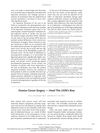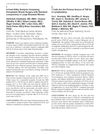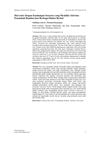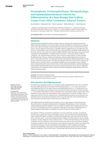 10 citations,
February 2019 in “The New England Journal of Medicine”
10 citations,
February 2019 in “The New England Journal of Medicine” Removing lymph nodes does not improve survival for advanced ovarian cancer and may cause more complications.
 September 2003 in “Clinics in Family Practice”
September 2003 in “Clinics in Family Practice” Different hair diseases affect people during childbearing years, with treatments ranging from medication to psychological support.
June 2023 in “Journal of Face Aesthetics” PRF is promising for dental and aesthetic uses but needs more research.
 17 citations,
June 2019 in “The journal of immunology/The Journal of immunology”
17 citations,
June 2019 in “The journal of immunology/The Journal of immunology” A specific DNA region is crucial for Foxn1 gene expression in thymus cells but not in hair follicles.
 July 2024 in “Journal of the American Academy of Dermatology”
July 2024 in “Journal of the American Academy of Dermatology” Botulinum toxin may help treat male pattern baldness.
 1 citations,
April 2016 in “Plastic and Reconstructive Surgery – Global Open”
1 citations,
April 2016 in “Plastic and Reconstructive Surgery – Global Open” Oncoplastic breast surgery is more cost-effective than standard lumpectomy for large-breasted women despite being more expensive.
Oral contraceptives and antiandrogens are the best treatments for hirsutism.
19 citations,
June 2017 in “Asian journal of urology” Family doctors can manage older men with urinary symptoms using exams, tests, and medications.
3 citations,
March 2022 in “Transgender Health” More research is needed to improve lower body gender affirmation techniques.
 July 2023 in “Journal of Plastic Reconstructive and Aesthetic Surgery”
July 2023 in “Journal of Plastic Reconstructive and Aesthetic Surgery” The study shows the UK's injectable aesthetic industry is diverse and under-regulated, posing risks to patients.
 1 citations,
July 2022 in “Bandung Conference Series. Pharmacy”
1 citations,
July 2022 in “Bandung Conference Series. Pharmacy” Hair tonic with candlenut oil promotes hair growth and meets quality standards.
 45 citations,
November 2012
45 citations,
November 2012 The conclusion is that androgen receptor gene polymorphism might be a marker for polycystic ovary syndrome, but more research is needed.
 29 citations,
September 2014 in “American Journal of Dermatopathology”
29 citations,
September 2014 in “American Journal of Dermatopathology” Horizontal sections of scalp biopsies are good for diagnosing Central Centrifugal Cicatricial Alopecia and help customize treatment.
 5 citations,
August 2020 in “Curēus”
5 citations,
August 2020 in “Curēus” The document concludes that recent studies help tell apart desmoplastic trichoepitheliomas from other skin tumors, but more research is needed for clear differentiation.
22 citations,
February 2007 in “Developmental neurobiology” Hormones and sex affect potassium channel gene expression in electric fish, influencing their communication signals.
 14 citations,
June 2013 in “Joint Bone Spine”
14 citations,
June 2013 in “Joint Bone Spine” ACTH may be an effective first-line treatment for acute calcium pyrophosphate crystal arthritis.
 January 2015 in “Hair therapy & transplantation”
January 2015 in “Hair therapy & transplantation” Some botanical products may help increase hair growth in people with alopecia, but more research is needed.
100 citations,
December 2002 in “Journal of biological chemistry/The Journal of biological chemistry” Researchers mapped and categorized specific keratin-associated protein genes on human chromosome 21q22.1.
October 2018 in “Dermatologic Surgery” 35 citations,
April 1993 in “Clinics in dermatology” Rosacea is a common skin condition mainly causing facial redness.
 July 2024 in “JPRAS Open”
July 2024 in “JPRAS Open” Lip feminization is important for transgender women, requiring personalized approaches and expert consultation for best results.
 February 2008 in “Medical & surgical dermatology”
February 2008 in “Medical & surgical dermatology” Some treatments like topical oxygen and stem cells show promise for wound healing and hair growth, but evidence for modern dressings over traditional ones is limited.
 June 2023 in “MPI (Media Pharmaceutica Indonesiana)”
June 2023 in “MPI (Media Pharmaceutica Indonesiana)” A hair tonic made from kale leaves is effective for hair growth and meets Indonesian standards.
 1 citations,
August 2020 in “IntechOpen eBooks”
1 citations,
August 2020 in “IntechOpen eBooks” Old drugs like finasteride and spironolactone are being successfully used for hair loss and skin conditions, and many other drugs show promise for new uses in dermatology.
December 2007 in “Pediatrics in review” Some CAM therapies help with pediatric atopic dermatitis, but more research is needed.
 September 2018 in “Value in Health”
September 2018 in “Value in Health” Orphan drug benefit scores in Germany are influenced by phase III data and lack of alternatives, but not linked to price or discounts.
4 citations,
January 2011 in “International Journal of Clinical Medicine” Patients with metastatic breast cancer treated with epirubicin and docetaxel had a good response and maintained their quality of life.
 48 citations,
May 2019 in “Genome Biology”
48 citations,
May 2019 in “Genome Biology” Researchers found that certain RNA circles in the brain are linked to disease risk, but their exact role in disease is still unknown.
 19 citations,
November 2011
19 citations,
November 2011 Using systemic drugs as creams for skin conditions shows promise, but more research is needed to confirm their effectiveness and safety.



















